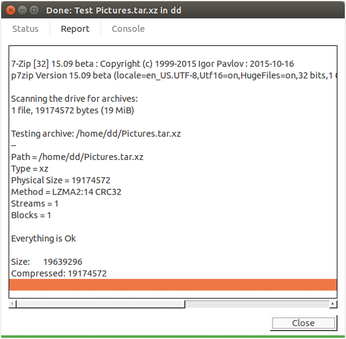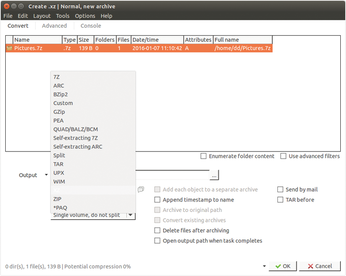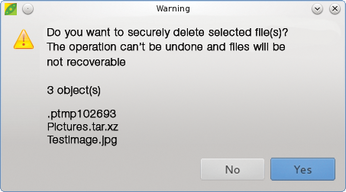PeaZip compression tool tested
Converting Archives
If you frequently manage archives from different programs, you will often need to convert an archive to a different format (e.g., if most of the other programs can't handle the existing format). PeaZip gives you a Convert button for fast conversion of an archive to a different format.
The corresponding dialog has very similar settings to those used for creating and extracting archives. After selecting the archive to convert in the file browser, you can select a format from an impressive list. Press OK to start converting. Note that the software cannot convert archives of different formats in a single action. Moreover, password protection prevents conversion (Figure 5).
You might find yourself faced with a situation in which a computer does not save an archive correctly, particularly in the case of faulty media. To make sure that your archive will work fully and without error on external media, you can use the test routine that PeaZip provides for this purpose. Select the archive in question and – in the button bar in the program window – press Test. The software then intensively tests the archive and outputs a report in a separate window (Figure 6).
 Figure 6: If needed you can test your PeaZip archives' integrity. The settings offer various algorithms for doing so.
Figure 6: If needed you can test your PeaZip archives' integrity. The settings offer various algorithms for doing so.
Secure Deletion
If you want to remove archives securely so that they cannot be reconstructed, first select the desired entry in the list by clicking on Securely delete. PeaZip treats archives, unpacked files, subdirectories, or hidden directories and hidden files in the same directory in the same way, showing you all of the objects marked for deletion in a safety prompt and listing the names. You first need to click OK for the objects to be deleted permanently by overwriting with randomly generated numbers and letters (Figure 7).
Conclusions
PeaZip is a very useful tool – especially for power users who frequently need to handle a variety of archives from different sources. The software offers a feature scope that is well beyond the norm and typically requires only a short learning curve. In our lab, testers were also impressed by the speed at which the program works. Our only points of criticism were occasional signs of instability that occurred when several instances of the software were open at the same time. That said, the developers do put a great amount of work into maintaining PeaZip and regularly release updates, so these bugs are likely to be fixed in the near future.
Infos
- PeaZip: http://www.peazip.org
« Previous 1 2 3
Buy this article as PDF
(incl. VAT)
Buy Linux Magazine
Subscribe to our Linux Newsletters
Find Linux and Open Source Jobs
Subscribe to our ADMIN Newsletters
Support Our Work
Linux Magazine content is made possible with support from readers like you. Please consider contributing when you’ve found an article to be beneficial.

News
-
Canonical Releases Ubuntu 24.04
After a brief pause because of the XZ vulnerability, Ubuntu 24.04 is now available for install.
-
Linux Servers Targeted by Akira Ransomware
A group of bad actors who have already extorted $42 million have their sights set on the Linux platform.
-
TUXEDO Computers Unveils Linux Laptop Featuring AMD Ryzen CPU
This latest release is the first laptop to include the new CPU from Ryzen and Linux preinstalled.
-
XZ Gets the All-Clear
The back door xz vulnerability has been officially reverted for Fedora 40 and versions 38 and 39 were never affected.
-
Canonical Collaborates with Qualcomm on New Venture
This new joint effort is geared toward bringing Ubuntu and Ubuntu Core to Qualcomm-powered devices.
-
Kodi 21.0 Open-Source Entertainment Hub Released
After a year of development, the award-winning Kodi cross-platform, media center software is now available with many new additions and improvements.
-
Linux Usage Increases in Two Key Areas
If market share is your thing, you'll be happy to know that Linux is on the rise in two areas that, if they keep climbing, could have serious meaning for Linux's future.
-
Vulnerability Discovered in xz Libraries
An urgent alert for Fedora 40 has been posted and users should pay attention.
-
Canonical Bumps LTS Support to 12 years
If you're worried that your Ubuntu LTS release won't be supported long enough to last, Canonical has a surprise for you in the form of 12 years of security coverage.
-
Fedora 40 Beta Released Soon
With the official release of Fedora 40 coming in April, it's almost time to download the beta and see what's new.



